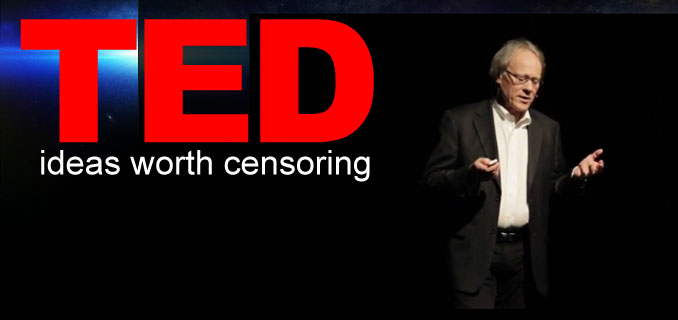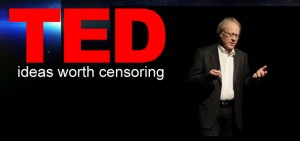Friday 29th March
Continuing censorship of TEDx talks of Graham Hancock and Rupert Sheldrake as yet unexplained by TED following their Science Board’s retraction of sweeping claims of “unscientific and factual errors”
TED ignores calls for a free and fair debate from both Hancock and Sheldrake, as well as an appeal from London TEDx organisers to reinstall the talks to the TEDx Youtube channel
Public internet outrage continues across the internet
On TED.com the issue receives more comments than any subject previously aired by TED
TED’s censoring of Graham Hancock’s talk The War on Consciousness and Rupert Sheldrake’s talk The Science Delusion by removing them from the TEDx Youtube channel (14th March) claiming “pseudoscience” and citing unsubstantiated “factual and scientific errors” sparked a widespread internet outrage, with thousands of public commentators calling TED’s actions a violation of free speech or criticising TED for bowing to pressure from corporate sponsors. The full background story can be found in this previous blog press release.
Hancock and Sheldrake have refuted all the original allegations of “pseudo-science” that TED levelled as justification for the removal of the talks from the TEDx Youtube channel. On the TED website, TED’s allegations (now crossed out), and Hancock and Sheldrake’s rebuttals, as well as the talks themselves, can be seen on this Blog Discussion page.
In an attempt to move things forward in a just and helpful way, Hancock and Sheldrake have both issued challenges to TED / a TED scientist to engage them face to face in free and fair public debate – see Hancock here and Sheldrake here on 20th March.
Then on Friday 22nd March, Amrita Bohi, Stefana Bosse and Jennifer Tessler – the organisers of the London TEDx Whitechapel conference where the talks were hosted – wrote an open letter to TED questioning their actions, calling on TED to reinstate the videos of the talks to the TEDx Youtube channel, and appealing for TED to answer Hancock and Sheldrake’s call for free and fair debate.
In their open letter to TED (which can be read in full on the TEDx Whitechapel Facebook page) the TEDx Whitechapel organisers said:
“We are now even stronger in our conviction that these are valuable ideas that need to be discussed and debated widely. The massive response from the TED community and the conversations which this has sparked, tells us that there is much interest in these ideas and therefore that they are highly valuable to the science debate…
“Therefore, we do not support your actions to put the talks on separate blogs where they are hidden from the TED community, cannot be shared, and where the conversation is limited. We also oppose the lack of integrity with which they have been treated. In particular, it is obvious that the content of many of the other existing TEDtalks would not hold up to scrutiny were the same criteria applied to them. Furthermore, we hope that you would grant your community the respect to use their own faculties of discretion and reasoning with regard to the ideas and content of the talks.
“As such, we request and urge you to re-upload the talks not only to the TEDx youtube channel, but also on the official TED.com site, including links to the discussions taking place on the TED blog. We also see this as a vital opportunity for TED to enhance their reputation as a forum for the free flow and sharing of ideas and open debate and an opportunity to win back the trust which may have been lost.”
TED continue to sidestep all requests for proper validation of their actions, to deny they have even censored the talks, and to ignore the appeals for the talks to be reinstated to the TEDx Youtube channel, as well as the calls for free and fair debate with Hancock and Sheldrake. They have also let the blog discussions for these talks gradually slide down the visibility scale on their website, giving the impression that they hope the whole embarrassing saga will quietly dissolve, soon to be forgotten.
Furthermore TED have employed the tactic of creating multiple “conversations” concerning the censoring of Hancock and Sheldrake’s talks to minimise the obvious impact that would be made if this were in just one big discussion. But there have been more comments in the shortest time about this issue on TED’s website – a total of 4067 by 28th March – than on any other subject previously aired by TED. Interestingly a debate about the US Second Amendment on the TED website (started 18th January) – flagged up as the “most-commented TED Conversation yet” – has only received 1380 comments to date (28th March).
Meantime, the whole controversy continues to mushroom across the internet and social media giving the banned talks more exposure than they perhaps would have had if TED had not censored them in the first place and rallying mass support and new fans for the speakers.
Graham Hancock says:
“A positive outcome would be for TED to agree to the free and open live streamed public debate with our scientific critics at TED that both Rupert Sheldrake and I have called for. Longer term I would hope TED might be less concerned about weeding out talks that might annoy its corporate sponsors and more trusting of the intelligence and discernment of its audience. TED began as a great platform for spreading challenging and cutting edge ideas. It should try to stay that way.”
For background on this TED censorship scandal, visit Graham Hancock’s website
And his author Facebook page: https://www.facebook.com/Author.GrahamHancock
SEE PAGES ON TED.COM FOR FURTHER DISCUSSION OF THE CONTROVERSIAL PRESENTATIONS BY GRAHAM HANCOCK AND RUPERT SHELDRAKE:
https://www.ted.com/conversations/17190/the_debate_about_graham_hancoc.html
https://www.ted.com/conversations/17189/the_debate_about_rupert_sheldr.html


